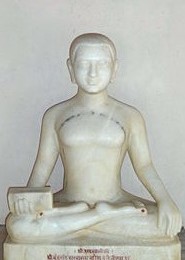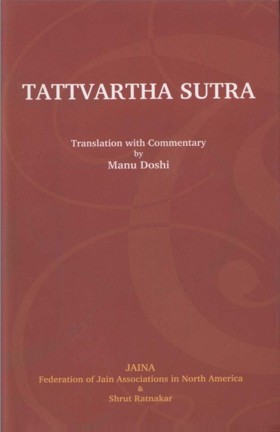06.11 Tatpradoshninhavmātsaryantarayāsādanopa-ghātā Jnāndarshanāvaranayoh
Audio: Sanskrit: तत्प्रदोषनिह्नवमातर्यान्तरायासादनोपघाता ज्ञानदर्शनावरणयो: ।
Hindi: तत्प्रदोष, निह्नव, मात्सर्य, अन्तराय, आसादन तथा उपघात ये ज्ञानावरण व दर्शनावरण कार्म के बन्धहेतु (आस्रव) है।
06.12 Duhkhshoktapākrandanvadhparidevanāny-ātmaparobhaysthānyasadvedasya
Audio: Sanskrit: दुःखशोकतापाक्रन्दनवधपरिदेवनान्यात्मपरोभयस्थान्यसद्वेद्यस्य ।
Hindi: स्व-आत्मा में, पर-आत्मा में या दोनों में स्थित दुःख, शोक, ताप, आक्रन्द, वध और परिवेदन ये असातावेदनीय कर्म के बन्धहेतु हैं।
06.13 Bhootvratyanukampā Danam Sarāgsanyamādi-yogah Kshantih Shauchamiti Sadvedasya
Audio: Sanskrit: भूतव्रत्यनुकम्पा दानं सरागसंयमादियोग: क्षान्ति: शौचमिति सद्वेद्यस्य: ।
Hindi: भूत-अनुकम्पा, व्रती-अनुकम्पा, दान, सरागसयमादि योग, क्षान्ति और शौच ये सातवेदनीय कर्म के बन्धहेतु है।
06.14 Kevatishrutsanghdharmadevāvarnavado Darsha-namohasya
Audio: Sanskrit: केवलिश्रुतसङ्गधर्मदेवावर्णवादो दर्शनमोहस्य ।
Hindi: केवलज्ञानी, श्रुत, संघ, धर्म एवं देव का अवर्णवाद दर्शनमोहनीय के बन्ध हेतु है।
06.15 Kashāyodayāttivrātmaparinamashchāritramoh-asya
Audio: Sanskrit: कषायोदयातीव्रपरिणामश्चारित्रमोहस्य ।
Hindi: कषाय के उदय से होने वाला तीव्र आत्मपरिणाम चारित्र मोहनीय क्रमांक बन्धहेतु है ।
06.16 Bahvārambhparigrahatvam Cha Nārakasyāyus-hah
Audio: Sanskrit: बह्वारम्भपरिग्रहत्वं च नारकस्यायुषः ।
Hindi: बहु-आरम्भ और बहु-परिग्रह नरकायु के बन्धहेतु हैं।
06.17 Maya Tairyagyonasya
Audio: Sanskrit: माया तैर्यग्योनस्य ।
Hindi: माया तिर्यंच-आयु का बन्धहेतु है।
06.18 Alpārambhparigrahatvam Swabhāvmārda-vārjavam Cha Mānushasya
Audio: Sanskrit: अल्पारम्भपरिग्रहत्वं स्वभावमार्दवर्जवं च मानुषस्य ।
Hindi: अल्प-आरम्भ, अल्प-परिग्रह, स्वभाव में मृदुता और सरलता ये मनुष्य-आयु के बन्ध हेतु है।
06.19 NJhshilvratatvam Cha Sarveshām
Audio: Sanskrit: नि:शीलव्रततत्वं च सर्वे षाम् ।
Hindi: शीलरहितता और व्रत रहितता तथा उपरोक्त अल्प-आरम्भ आदि सभी आयुओं के बन्धहेतु है।
06.20 Sarāgsanyamsanyamāsanyamākāmnirjarābā-ltapānsi Devasya
Audio: Sanskrit: सरागसंयमसंयमासंयमाकामनिर्जराबालतपांसि दैवस्य ।
Hindi: सरागसंयम, संयमासंयम, अकामनिर्जरा और बालतप ये देवायु के बन्धहेतु हैं।
06.21 Yogvakratā Visamvādanam Chashubhasya Namnah
Audio: Sanskrit: योगवक्रता विसंवादनं चाशुभस्य नाम्न: ।
Hindi: योग की वक्रता और विसवाद अशुभ नामकर्म के बन्धहेतु है।
06.22 Viparitam Shubhasya
Audio: Sanskrit: विपरीतं शुभस्य ।
Hindi: विपरीत अर्थात् योग की अवक्रता और अविसंवाद शुभ नामकर्म के बन्धहेतु है ।
06.23 Darshanvishuddhirvinaysampannatā Shilvrateshvanatichāro'bhikshnam Jnānopayogsamvegau Shaktitastyāgtapasi sanghsādhusamādhivaiyāvrtyakar-anamarhadāchāryabahushrutpravachanbhaktirāvashy-akāparihānimargaprabhāvana Pravachanvatsalatvamiti Tirthakrttvasya
Audio: Sanskrit: दर्शनविशुद्धिर्विनयसम्पन्नता शीलव्रतेष्वनतिचारोsभिक्ष्णं ज्ञानोपयोगसंवेगौ शक्तितस्त्यागतपसी सङ्गसाधुसमाधिवैयावृत्त्यकरणमर्हदाचार्यबहुश्रुतप्रवचनभक्तिरावश्यकापरिहाणिर्मार्गप्रभावना प्रवचनवत्सलत्वमिति तीर्थकृत्त्वस्य ।
Hindi: दर्शनविशुद्धि, विनयसम्पन्नता, शील और व्रतों में अत्यन्त अप्रमाद, ज्ञान में सतत उपयोग तथा सतत सवेग, यथाशक्ति त्याग और तप, संघ और साधु की समाधि और वैयावृत्त्य करना, अरिहंत, आचार्य, बहुश्रुत, तथा प्रवचन की भक्ति, आवश्यक क्रिया को न छोड़ना, मोक्षमार्ग की प्रभावना और प्रवचनवात्सल्य ये सब तीर्थंकर नामकर्म के बन्धहेतु है।
06.24 Parātmanindaprashanse Sadasadgunāchchhādan-odbhāvane Cha Nichairgotrasya
Audio: Sanskrit: परात्मनिन्दाप्रशंसे सदसद्गुणाच्छादनोद्भावने च नीचैर्गोत्रस्य ।
Hindi: परनिन्दा, आत्मप्रशंसा, सद्गुणों का आच्छादन और असद्गुणों का प्रकाशन ये नीच गोत्रकार्म के बन्धहेतु है।
06.25 Tadviparyayo Nichairvrttyanutsekau Chottarasya
Audio: Sanskrit: तद्विपर्ययो नीचैर्वृत्त्यनुत्सेकौ चोत्तरसिव।
Hindi: उसका विपर्यय अर्थात् परप्रशंसा, आत्मनिन्दा आदि नम्रवृत्ति और निरभिमानता ये उच्च गोत्रकर्म के बन्धहेतु है।
06.26 Vighnakaranamantarāyasya
Audio: Sanskrit: विघ्नकरणमन्तरायस्य ।
Hindi: दानादि में विघ्न डालना अन्तरायकर्म का बन्ध हेतु है।
06.11-26
English: These sutras specify the types of activities that lead to different categories of Karma. Every activity leads to some Karma. Since there are innumerable types of activities, Karmas arising from that can also be of innumerable types. All of them are divided into eight main types and 93 categories, which will be described in chapter 8.
The sutra 11 states that vilification, concealing, withholding, obstructing, disrespect and condemnation of the means and/or sources of acquiring knowledge or perception lead to knowledge-obscuring or perception-obscuring Karma. Resenting a true presentation or wholesome display is called vilification. To hide the name of the true benefactor is treated as concealing. Not to confer knowledge to a deserving person is considered withholding. Raising obstacles in the way of knowledge is called obstruction. Disrespect denotes deliberate disregard towards the knowledgeable or to the means of knowledge, while outright opposition or total absence of appreciation amounts to condemning.
Knowledge and perception are closely related terms. To know about something is knowledge, while having faith and conviction therein is perception. The purpose of specifying the above mentioned factors as the causes of obscuring Karma is to learn that whoever hurts, hinders or shows disregard for the knowledgeable persons or for the means of acquiring knowledge incurs the bondage of knowledge obscuring or perception obscuring Karma. Knowingly or unknowingly we happen to indulge in such activities. For instance, a book is a source of knowledge, while turning a rosary is symbolic of faith. As such, mishandling or otherwise having disregard for the book or the rosary would lead to knowledge or perception obscuring Karma.
Sutra 12 specifies the factors that lead to Ashātāvedaniya (uncomfortable situations conferring) Karma. It states that distress, lamentation, pain, wailing, violence and affliction caused to the self or to others are the causes of acquiring that Karma. By indulging in such activities, one gets distressful, miserable or other uncomfortable situations, which one has to bear with pain and unhappiness.
The contrary also is true. Sutra 13 therefore states that compassion to the living beings in general and to the people observing restraints in particular, charities, observance of restraints with the sense of attachment, forbearance and purity are the causes of acquiring Shātāvedaniya (comfortable situations conferring) Karma. By virtue of such activities, one gets the situations that can be availed with pleasure and happiness.
One of the causes laid here is the observance of restraint with attachment. There is a purpose in specifying the term 'with attachment*. Though one might have taken the vow to observe restraint, he is going to have some degree of attachment till he reaches the delusion-free state. The aspirant, who has not reached that state, may therefore observe restraint while harboring some degree of attachment. Thereby he acquires Karma that provides happy and comfortable situations. If one observes restraints with the sense of detachment, he would eradicate the Karma and would not acquire the new one.
Sutrasl4 and 15 deal with deluding Karma. One can try to avert the impact of other Karmas, when he becomes aware of the same. For instance, if he finds it hard to memorize on account of the impact of knowledge-obscuring Karma, he can try to overcome that impact by repeatedly reciting it and may become successful. But it is hard to overcome the deluding Karma, because that Karma causes delusion in his mind. He fails to realize that he is under the impact of delusion and as such does not even think of overcoming it.
Delusion is of two types, perception-related and character-related. Sutra 14 deals with the former, it states that calumny or slanderously talking about omniscient Lords, scriptures, religious order, religious doctrines or the heavenly beings leads to perception-deluding Karma. Denying the concept of omniscience or insisting that the detached Lords are of no use to us, because they cannot confer happiness or pleasure amounts to slandering the omniscient Lords. It would be easy to conceive of similar examples that would indicate slandering of the scriptures etc.
Sutra 15 states that acutely perverted mode of soul by virtue of the rise of defilement leads to character-related deluding Karma. Rag and Dwesh (attachment and aversion) are the basic defiling instincts. They are usually expressed in the form of anger, pride, deception and greed, which are known as Kashāys. Such instincts can operate in mild or acute form. When it is mild, the person may stay more or less vigilant about it. As such, there is scope for overcoming it.
When, however, it operates in acute form, it is hard to maintain vigilance. Under the impact of such defilement, one tends to think that whatever he does is right. For instance, an angry or arrogant person would feel that he has the reason to be angry or to be proud (his pride actually happens to be arrogance) of his achievement. He thus considers his behavior justified and sees no reason to overcome his defilement. The operation of acute defilement is therefore laid as the cause of acquiring this Karma. There are 25 types of defilement, which we are going to discuss in chapter 8
Sutras 16 and 17 deal with the causes of getting infernal, animal and sub-animal life. Indulging in very violent activity and excessive possessive ness lead to the infernal life. In other words, undertaking the violent activities with vigor and pleasure, too much attachment for the belongings, trying to accumulate too much etc. lead to the life at infernal level. Indulging in deception leads to animal or sub-animal life like microscopic beings and one sensed to four sensed beings.
Sutras 18 to 20 deal with the causes of gaining human and heavenly life. Activities with a low level of violence, limited accumulations, mildness, forthrightness etc. lead to the human life. The observance of restraints with a low degree of attachment, partial observance of restraints, involuntary expiration of Karmas and ritual observance of austerities lead to the heavenly life. On the other hand, loss of conduct and non-observance of restraint can lead to any type of life depending upon the degree of loss and shortfall.
Sutras 21 and 22 deal with Nam (physique-determining) Karma. These sutras state that wrong or evil exercising of mental, verbal and physical faculties and raising quarrels or disputes lead to unwholesome Nam Karma that provides poor physique. On the other hand, activities contrary to that lead to wholesome Nam Karma that leads to good physique. It means that appropriately exercising of those faculties and promoting unity and harmony among others would lead to a healthy body etc.
Tirthankar Nam Karma, which is a sub-category of Nam Karma, is of the most wholesome type. Sutra 23 stipulates following 16 aspects that lead to that Karma, viz. i) purity of perception, ii) utmost modesty, iii) faultless observance of spiritual code and restraints, iv) maintaining pure awareness, v) acute desire for liberation, vi) charity, vij) austerities to the extent possible, viii) extending peace and security to the religious order, particularly to the monks and nuns, ix) selfless servicing, x to xiii) dedication to the cause of omniscient Lords, heads of order, learned people and sacred books, xiv) observance of six essentials, xv) promoting the right path and xvi) affection towards the fellow religionists. By pursuing these aspects, one earns the wholesome Karma of being a Tirthankar.
Sutras 24 and 25 stipulate that criticizing others, praising the self, concealing the virtues and publicizing the vices of others result in acquisition of low status Karma. That leads to a birth in lower families, while the factors contrary to that lead to the birth in a high status family. In other words, one is born in a noble family by critically examining the self, praising the attributes of others and so on.
The last sutra deals with obstructing Karma. That Karma leads to obstructions in the areas of extending charity, gaining advantage, experiencing satisfaction and comfort by using or consuming various objects and in exerting vigor. This Karma arises by raising obstructions to others, who are undertaking charities or who are pursuing other wholesome activities
 Acharya Umaswati
Acharya Umaswati
